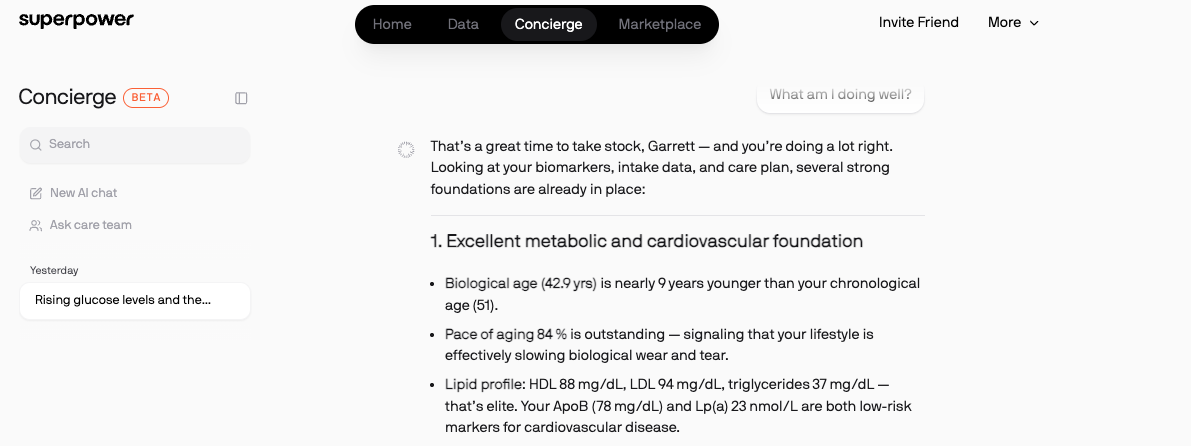What Is Superpower’s Superpower?
Superpower: Beautiful Design, Some Unfinished Product
Direct-to-consumer health testing is having its moment, and Superpower wants to be your "health super app." But does this gorgeous newcomer deliver on its ambitious promise, or is it more sizzle than steak?
I'm a Product Guy who's built health tech products, so when Superpower launched publicly in April 2025 with $30 million in Series A funding and a 150,000-person waitlist, I had to see what the hype was about. For $499 now $199 per year, they offer annual lab testing analyzing over 100 blood biomarkers, promising to make elite concierge medicine more affordable.
I love the founding story, it’s compelling and I can relate. Co-founder Jacob Peters nearly died after $2 million in medical bills while battling undiagnosed conditions, Max Marchione faced decades of misdiagnoses from 20+ doctors, and Kevin Unkrich lost his best friend to a brain tumor just two days before a scheduled MRI. They built Superpower to solve a real problem: our healthcare system is great at treating disease but terrible at preventing it. I’ve had similar experiences and am fully bought in, so let’s go!
THE GOOD
Stunning Design, A+
Let's start with what Superpower absolutely nails: the visual experience. This is hands-down the most beautiful health platform I've used. It’s one of the more stunning consumer web apps out there.
Every screen feels premium,
the typography is crisp,
the color palette is sophisticated,
and the data visualizations are gorgeous.
If design awards were the goal, they'd win. The interface makes you want to engage with your health data, which is no small feat.
Comprehensive Testing, A
The core offering includes 100+ biomarker lab tests with no hidden fees, HSA/FSA eligibility, and access to a medical team. The testing covers everything you'd expect:
cardiovascular,
hormones,
metabolic,
inflammation,
nutrients,
kidney and liver function,
and immune health.
Testing takes about 10 days to process, and you can book labs in 15 minutes at one of their 2,000 partner locations nationwide or schedule a home visit.
The Marketplace Concept, A+
Superpower offers curated supplements with members-only discounts and the ability to book additional diagnostics right from your dashboard. Having a "buy" button in line with your health recommendations is genuinely useful. They promise price matching if you find items cheaper elsewhere, which is a nice touch. The convenience of going from "your cortisol is high" to "here's the supplement protocol" to "add to cart" saves time and mental energy.
OPPORTUNITIES FOR IMPROVEMENT
No Mobile App, C-
Seriously? This is my biggest complaint and it's a big miss. Superpower is currently only accessible through a web app. You're building a health platform in 2025 that you want people to check regularly, potentially multiple times per month if they're buying supplements or tracking progress, and there's no native mobile experience?
Black Box Analysis, B-
Superpower's AI is "trained on medical literature with proprietary biomarker data, enabling real-time personalization", according to their CTO. That sounds impressive, but in practice, the AI-generated insights feel generic and lack the depth you need to actually understand what's happening in your body.
When I got my results, I was left with more questions than answers. The analysis tells you what is out of range, but doesn't do a great job explaining why it matters or how the different biomarkers relate to each other. There's no clear narrative connecting the dots between, say, your inflammation markers, your sleep quality, and your energy levels. Gripes aside, it is a good start and I expect this to improve.
Wearable Integration is Broken, D+
Superpower uses a third-party service called Vital to integrate wearables, but the execution is woefully incomplete. For this feature, they just mailed it in. Apple Health Kit isn't supported, which is absurd for a health platform in 2025. When I tried to connect to Strava, I got an error message saying Superpower exceeded their API connection limit; does this mean they didn’t pay their bill?
I did manage to connect my Oura ring, but I have no idea how that data is being used. There's no clear indication in the platform that my sleep scores or HRV trends are informing my health recommendations. When I asked, the AI-Concierge can’t find my Oura data. This feels like a feature that was half-built and then abandoned.
Lack of Transparency, C
The platform combines extensive testing, clinical-grade diagnostics, functional medicine protocols, and AI health guidance, but what does that actually mean? The website is full of buzzwords about "longevity protocols" and "world's most intelligent health optimization system," but there's limited clarity about the methodology behind the recommendations.
Superpower practices a "root-cause, holistic care model" offering targeted pharmaceuticals like hormones and peptides, but the criteria for prescribing these aren't well-explained. When and why would they recommend peptides versus lifestyle changes versus supplements? The lack of transparency makes it hard to trust the recommendations, especially for interventions that go beyond basic nutrition and exercise. For example, I’m not about to dive headfirst into the murky world of peptides without thorough explanation.
AI Concierge, TBD
Initially Superpower’s concierge service felt more like a band-aid, marketing spin for incomplete product development. But the release of their AI Concierge Beta shows serious promise. In my experience it did well with generic prompts like “What are my top interventions to improve my health?” And helped create a personalized plan for me. “Would you like me to create a calendar‑style schedule (week‑by‑week task reminders and testing milestones) so it integrates cleanly into your existing care plan?” This is awesome, this is the future. Let’s go!
Hold on! Let's pump the breaks. When I asked a specific question like “Why was I tired after my heavy strength training yesterday?” AI-Concierge recommended a pre-hormone that on the surface seemed like a good idea and offered to easily add it to my plan. Just say “yes.’” However, my research outside of Superpower uncovered that this has a known risk of accelerating prostate cancer. WTH?! And you should not take this pre-hormone if prostate cancer is in your family history. This is where things can go very wrong. Full stop. My concern with Superpower here is that unlike UI navigation, with an AI health coach it’s not OK if poorly executed. This needs to be bang on near perfect from the start. You cannot “beta” test YOLO with our health and figure it out as you go. This isn’t like using Claude to research the best flight from SFO to NYC, the wrong intervention could cause serious health issues. Stacking too many or the wrong supplements can result in elevated liver enzymes, kidney stress and hair loss.
FUTURE
The Killer Feature They Should Build
The obvious next move for any consumer health platform is proactive conversational AI, like having your own private concierge doctor. Imagine an AI agent that knows your complete biomarker history, understands your lifestyle and goals, matches these with your genetic and family history and can answer health questions in real-time with personalized context. This would unleash the full power of AI to offer proactive health recommendations and respond to your medical, health, and mental and physical fitness questions day or night.
Superpower's AI Concierge is a good first version of this concept, but like some other features feels very much like a beta, lacking the full context for making health recommendations without a human in the loop, i.e. a clinician.
THE BOTTOM LINE
Superpower was founded in 2023, so they're early. The bones of a great product are here: comprehensive testing, beautiful design, thoughtful integrations with treatments and supplements, AI greenshoots. But the execution isn't quite there yet. It's a gorgeous shell with an unfinished interior.
The lack of a mobile app could lead to frustration and limit engagement. The AI analysis needs to be 10x better. The wearable integrations need to actually work. The information architecture needs to be simplified. And the transparency around recommendations needs dramatic improvement.
For $199/year, you're paying for potential, not polish. If you're an early adopter who connects with sexy lifestyle brands and can tolerate rough edges, Superpower is worth trying. The $199 price point is just under two San Francisco parking tickets, and a perfect entry point for taking control of your health. For sure, consult your doctor for reviewing the results and before starting any new protocols.
Verdict: B+
Beautiful design can't compensate for some fundamental product gaps. Superpower needs stronger Product development before it's ready for prime time. AI is a start but very much a Beta. Check with your doctor before accepting any protocols.
Full Disclosure: I'm a former healthcare startup founder who understands this problem is difficult. I'm still a customer and rooting for Superpower to succeed.









